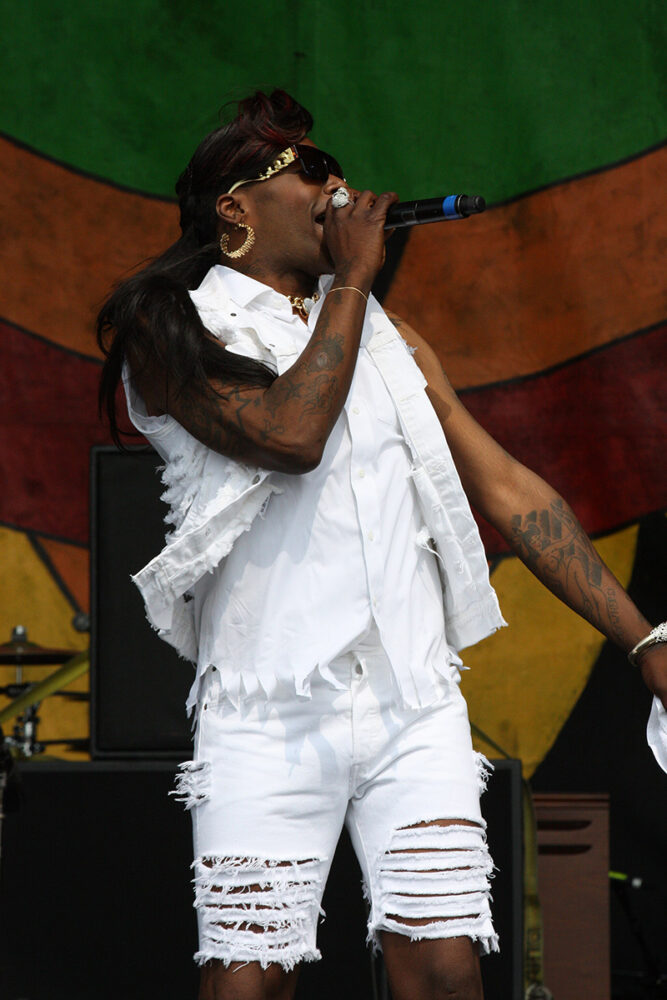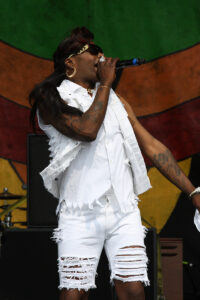Big Freedia
Big Freedia is a New Orleans-based performer and international ambassador for bounce music.

Wikimedia Commons
Big Freedia performing at the New Orleans Jazz & Heritage Festival, 2014. kowarski, photographer.
Born in 1978 Big Freedia (she, he, they) began performing as a rapper in New Orleans in the late 1990s and released her first album, Queen Diva (Money Rules Entertainment) in 2003. In the years immediately following Hurricane Katrina, Freedia became an international ambassador for bounce music, the danceable and distinctly New Orleanian rap subgenre that took shape in the early 1990s, but found little commercial traction outside the southeast. In the 2010s and 2020s, Big Freedia was featured on recordings and videos from musical superstars including Drake, Lizzo, Kesha, RuPaul, and Beyoncé. Freedia was also the subject of the GLAAD Media Award–winning reality TV show Big Freedia: Queen of Bounce (retitled Big Freedia Bounces Back), which ran for six seasons beginning in 2013, and of the 2020 anti-gun violence documentary Freedia’s Got a Gun.
Born Freddie Ross Jr. on January 28, 1978, in Charity Hospital, Big Freedia was raised in the Third Ward of Uptown New Orleans. She attended Carter G. Woodson Middle School and Walter L. Cohen High School, where she was a member of the cheerleading squad. She was also active in Pressing Onward Baptist Church. Big Freedia found a love of the stage through the church choir—first as a member and later as assistant choir director—but was also a big fan of the emergent local sound of bounce. In the late 1990s she began performing alongside Kenyon “Katey Red” Carter, the first openly gay New Orleans rapper to begin releasing music on a local label (1999’s Melpomene Block Party and the following year’s Y2Katey: Millennium Sissy on Take Fo’ Records). Big Freedia began attending the University of Louisiana at Lafayette’s nursing program but dropped out in her first year to focus actively on music, playing multiple club gigs and private parties weekly alongside rappers like Sissy Nobby, Vockah Redu, Katey Red, and Chev Off The Ave. That loose cohort, either openly gay or challenging norms of gender presentation in their shows, would eventually come to be known as “sissy bounce” artists—although in public comments, the performers themselves have expressed either ambivalence or dislike at being separated into a subgenre based on sexuality.
After Hurricane Katrina Big Freedia’s quick return to a busy live performance schedule in a city hungry for distraction, coupled with increased national interest in New Orleans music in the wake of the floods, raised her profile dramatically. For years Freedia had had success performing for a mostly Black, local audience in New Orleans. In the late aughts, creative collaborations and tours with the funk band Galactic and local DJ Rusty Lazer introduced her to new fans in the punk, electronic, and indie music scene around the country, playing large-scale festivals, appearing on late-night TV, and garnering coverage in publications from Pitchfork to the New York Times. In 2015, along with publicist and co-author Nicole Balin, Big Freedia published the autobiography God Save the Queen Diva! with Gallery Books, an imprint of Simon and Schuster. Freedia’s dynamic, high-energy, participatory live shows are also known for popularizing the lower-body dance move known as twerking to a crossover audience outside of the Black, southern communities that originated it. In 2014 she twice set a Guinness World Record for the most simultaneous twerkers, leading crowds in New York City and in New Orleans in mass rump-shaking.
Freedia has collaborated with and been sampled by a laundry list of pop, R&B, and hip-hop stars, most notably Beyoncé, who in 2016 sampled Big Freedia’s voice on the single “Formation,” the music video for which was shot in New Orleans. Beyoncé used another audio clip of Big Freedia to open dates on her Formation World Tour the same year; Freedia’s song “Explode” is also prominently sampled on “Break My Soul,” the lead single from Beyoncé’s 2022 album Renaissance. In 2018 Big Freedia appeared on the official Congo Square poster for the New Orleans Jazz and Heritage Festival.
